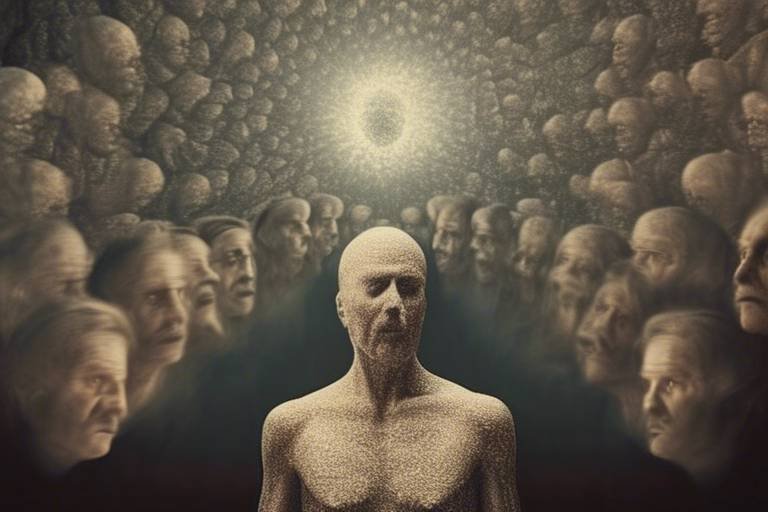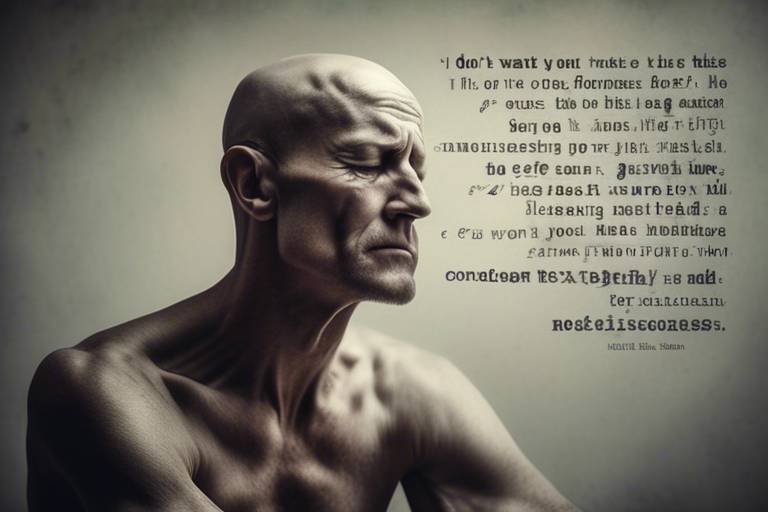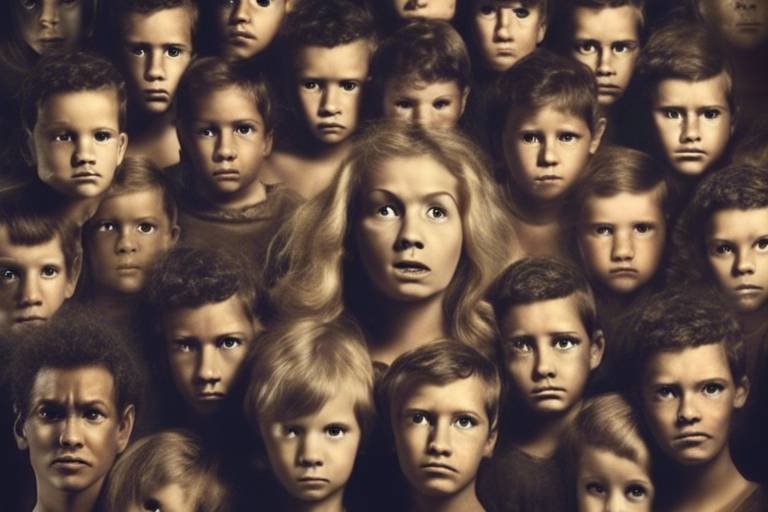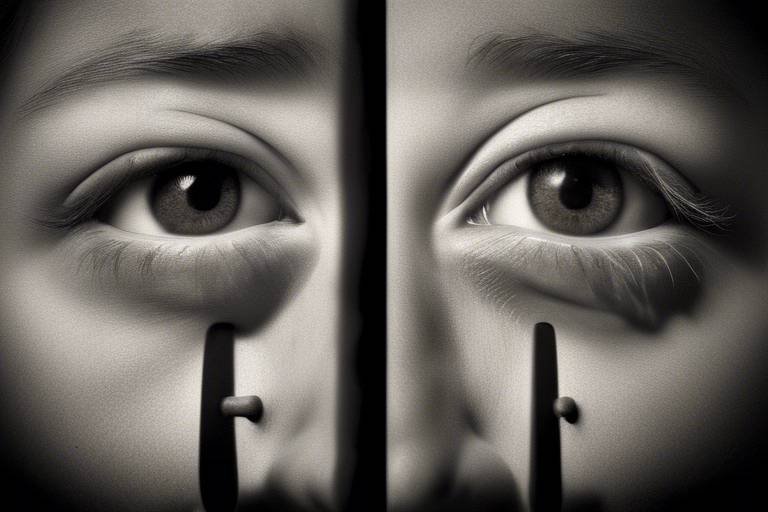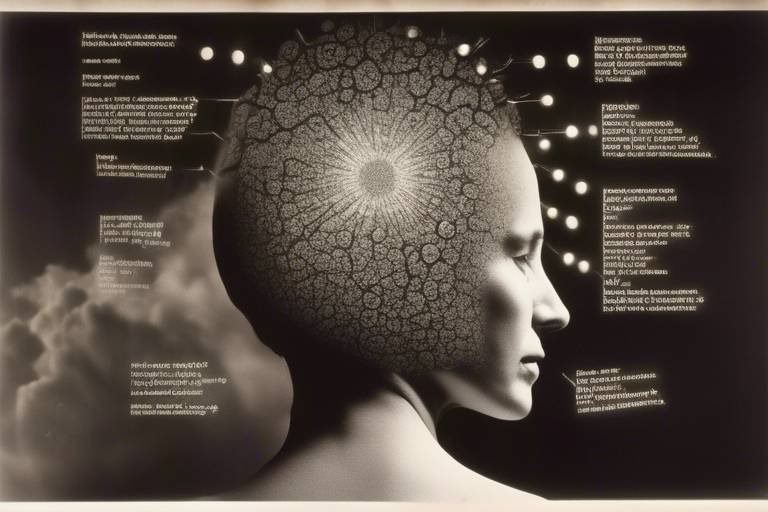Philosophical Implications of Altered States of Consciousness
The exploration of altered states of consciousness opens a Pandora's box of philosophical questions that challenge our understanding of reality, perception, and identity. These states, whether induced by meditation, psychedelics, or other means, compel us to reconsider the very essence of our existence. Imagine standing on the edge of a vast ocean, where each wave represents a different state of consciousness, crashing against the shore of our understanding. What lies beneath these waves? Are they mere illusions, or do they reveal deeper truths about the nature of reality?
At the heart of this philosophical inquiry is the notion that altered states can radically shift our perceptions. When we experience a different state of consciousness, it’s as if we are wearing a new pair of glasses that changes the color and clarity of everything we see. This raises the question: if our perceptions can be so easily altered, how can we trust our understanding of reality? Are we merely experiencing a construct shaped by our minds, or is there an objective reality that exists independent of our perceptions?
To delve deeper, we must consider the implications of these altered states on our identity. Have you ever felt a sense of unity with the universe during a profound experience? Such moments can lead to a re-evaluation of the self, where the boundaries between "I" and "the world" dissolve. This phenomenon invites us to ponder: if our identities can shift so dramatically, what does that say about the continuity of self? Are we the same person we were yesterday, or are we constantly evolving, shaped by our experiences?
Additionally, the philosophical implications extend into the realm of ethics. As we explore altered states, we must grapple with the responsibilities that come with seeking these experiences. Are we ethically obligated to consider the potential consequences of altering our consciousness? The line between beneficial exploration and reckless abandon can often blur, leading us to confront difficult questions about the nature of free will and the moral implications of our choices.
As we navigate this complex landscape, it becomes clear that altered states of consciousness are not just personal experiences; they are profound philosophical inquiries that challenge our most fundamental beliefs. They invite us to explore the depths of our minds, question the nature of reality, and redefine our understanding of identity. In doing so, we may find that the journey through these altered states is as enlightening as it is perplexing, revealing the intricate tapestry of existence itself.

The Nature of Reality
Altered states of consciousness have a way of turning our understanding of reality upside down. Imagine standing on a solid ground, only to have it shift beneath your feet. That's what these states do—they challenge the very essence of what we perceive as real. When we enter altered states, whether through meditation, psychedelic experiences, or intense emotional moments, our perception can transform drastically. Suddenly, the ordinary rules of reality seem to bend, warp, or even dissolve. This leads us to a profound question: if our perception can be so easily altered, how reliable is our understanding of reality?
Consider this: the world we experience is filtered through our senses, shaped by our previous experiences, beliefs, and even societal norms. When someone experiences an altered state, they often report sensations, visions, or feelings that are entirely outside the realm of their normal experience. For instance, a person on a psychedelic journey might see colors that are more vibrant than anything they have ever witnessed, or feel a sense of unity with the universe that defies explanation. In these moments, the boundaries of what is real and what is not can become blurred, leading to a rich tapestry of experiences that challenge conventional notions of reality.
Moreover, the implications of these altered perceptions extend beyond individual experiences. They beckon us to question the very nature of existence itself. If reality can shift so drastically based on our state of consciousness, does that mean there are multiple realities coexisting? Are we merely experiencing a version of reality that is filtered through our unique consciousness? These questions can feel like a philosophical rabbit hole, leading us to explore concepts such as solipsism—the idea that only one's mind is sure to exist—and the nature of shared reality.
To further illustrate this, consider the following table that summarizes the different ways altered states can influence our perception of reality:
| Altered State | Impact on Reality Perception |
|---|---|
| Meditation | Can lead to feelings of interconnectedness and transcendence. |
| Psychedelics | Often results in vivid hallucinations and a breakdown of ego boundaries. |
| Dreaming | Creates a reality where the impossible feels possible, challenging daily perceptions. |
| Extreme Emotions | Can distort time perception and alter the sense of self. |
As we delve deeper into these altered states, we must also confront the philosophical ramifications of our findings. If reality is not a fixed entity but rather a fluid concept shaped by our consciousness, what does that mean for our understanding of truth? Are we all just players in a cosmic game, each experiencing our own version of reality? This line of questioning not only opens up a Pandora's box of philosophical debate but also invites us to explore the ethical implications of how we navigate these altered states.
Ultimately, the nature of reality in the context of altered states serves as a reminder of our limitations as human beings. Our senses, while powerful, are not infallible. They can deceive us, leading us to form beliefs about the world that may not hold up under scrutiny. This realization can be both humbling and liberating, as it encourages us to remain open-minded and curious about the mysteries of consciousness and existence.

Perception and Experience
Altered states of consciousness have a profound impact on how we perceive the world around us. Imagine walking through a familiar neighborhood, only to find that the colors are more vibrant, the sounds are more profound, and the very essence of the place feels different. This shift in perception can lead us to question not just what we see, but how we experience reality itself. It’s like putting on a pair of glasses that changes the lens through which we view life. In these altered states, our senses can become heightened, dulled, or even completely transformed, leading to a subjective experience that is uniquely personal.
The subjective nature of experience is a cornerstone of understanding consciousness. When we talk about altered states, we are often referring to experiences that can be induced by various means—meditation, psychedelics, or even extreme physical exertion. Each method brings with it a different flavor of perception. For example, during a deep meditative state, one might feel an overwhelming sense of unity with the universe, while a psychedelic experience might lead to vivid hallucinations that challenge the very fabric of reality. These experiences can feel utterly real, yet they can also be fleeting and elusive, leaving us with lingering questions about the nature of existence.
Phenomenology of Altered States plays a crucial role in understanding how personal narratives shape our conception of consciousness. Each person's journey through these altered states is unique, influenced by their background, beliefs, and emotional state. Some individuals might describe their experiences in poetic terms, speaking of the colors and sounds that enveloped them, while others may focus on the emotional or spiritual revelations they encountered. This personal storytelling is vital, as it allows us to explore the vast landscape of human experience. It’s like collecting pieces of a puzzle, where each story adds depth and dimension to our understanding of consciousness.
Transcendental Experiences often redefine our understanding of self and existence. These moments can feel like a glimpse into something greater than ourselves, a connection to the universe that transcends ordinary perception. People often report feelings of bliss, interconnectedness, and profound insight during such experiences. It’s as if the boundaries that separate us from the world dissolve, leaving behind a sense of unity and purpose. This can lead to transformative changes in how individuals perceive their identity and their place in the universe.
On the other hand, Hallucinations and Reality present a fascinating paradox. When we experience hallucinations, we often find ourselves caught in a web of confusion—what is real and what is not? Philosophically, this challenges the very essence of perception. If our minds can create vivid images and sensations that feel entirely real, what does that say about our understanding of reality? Are we merely prisoners of our perceptions, or do we hold the power to shape our experiences? These questions become even more complex when we consider the implications of altered states on our sense of self.
In summary, altered states of consciousness offer a rich tapestry of experiences that challenge our perceptions and invite us to reconsider what it means to be human. They reveal the intricate dance between reality and illusion, forcing us to confront the depths of our consciousness. As we navigate these altered states, we are not just passive observers; we are active participants in a journey that can redefine our understanding of existence itself.
Frequently Asked Questions
- What are altered states of consciousness? Altered states of consciousness refer to any condition that significantly differs from normal waking consciousness, including states induced by meditation, drugs, or extreme experiences.
- How do altered states affect perception? They can heighten or distort sensory experiences, leading to a subjective reality that challenges conventional understanding.
- Are altered states beneficial or harmful? While they can offer therapeutic benefits, such as insights and emotional healing, there are also risks involved, especially with substance-induced states.

Phenomenology of Altered States
When we delve into the , we embark on a fascinating journey into the depths of human experience. Altered states of consciousness, whether induced by meditation, psychedelics, or extreme fatigue, offer a unique lens through which we can examine the very nature of our perception. Imagine standing on the edge of a vast ocean, where the waves of thought and emotion crash against the shore of your mind, reshaping your understanding of reality with every ebb and flow. It’s in these moments that we begin to question: what is truly real?
In altered states, our typical frameworks of understanding are often dismantled, revealing a tapestry of sensations and insights that are both bewildering and enlightening. For instance, individuals may report experiences of profound connectivity with the universe, where the boundaries of self seem to dissolve into the vastness of existence. This phenomenon can lead to a reevaluation of personal identity and a deeper comprehension of our place within the cosmos. The subjective nature of these experiences challenges the objective realities we cling to, prompting us to reconsider the essence of consciousness itself.
One of the most compelling aspects of this exploration is the personal narrative that accompanies altered states. Each person's journey through these experiences is as unique as a fingerprint, shaped by their history, beliefs, and emotional landscape. For example, someone undergoing a psychedelic experience might encounter vivid visual hallucinations or emotional catharsis, which can profoundly alter their perception of reality. These narratives not only enrich our understanding of consciousness but also highlight the importance of individual experience in the study of altered states.
To further understand this concept, let’s consider some key elements that often emerge during altered states:
- Intense Visual and Auditory Experiences: Many individuals report seeing vibrant colors or hearing sounds that seem to transcend ordinary perception.
- Feelings of Unity: A common theme is the sensation of oneness with the universe, where the individual feels connected to everything around them.
- Time Distortion: Time may feel as though it has slowed down or sped up, leading to a different understanding of past, present, and future.
These elements not only enrich the lived experience of altered states but also serve as a foundation for philosophical inquiry. As we navigate through these altered perceptions, we are compelled to ask ourselves: How does this affect our understanding of reality? What does it mean to truly perceive? The answers may lie in the intersection of personal experience and philosophical reflection, where the boundaries of self and reality blur, inviting us to explore the very fabric of existence.
Ultimately, the phenomenology of altered states offers a profound insight into the complexities of human consciousness. It challenges us to embrace the unknown and to seek understanding beyond the confines of conventional thought. In doing so, we may uncover not only the mysteries of our own minds but also the universal truths that bind us all.
- What are altered states of consciousness? Altered states of consciousness refer to any condition in which the mind is functioning differently from normal waking consciousness, often induced by meditation, drugs, or extreme fatigue.
- How do altered states affect perception? They can significantly shift our perception of reality, leading to experiences that may feel surreal or profoundly insightful.
- Can altered states lead to lasting changes in identity? Yes, many individuals report lasting changes in their sense of self and understanding of existence after experiencing altered states.

Transcendental Experiences
When we talk about , we're diving into a realm that goes beyond the ordinary. Imagine standing at the edge of a vast ocean, feeling the waves crash against your feet, and suddenly, you’re not just a person on a beach anymore; you’re part of something much larger, something that transcends your individual existence. These moments can be deeply transformative, often described as spiritual awakenings or profound insights that challenge our everyday understanding of life and reality.
In many cultures, transcendental experiences are linked to mystical states achieved through meditation, prayer, or even the use of certain substances. They often leave individuals with a sense of unity with the universe, a feeling that they are interconnected with all that exists. This leads to the question: What does it mean to truly experience something beyond ourselves? Are we merely observers of reality, or do we have the potential to become active participants in a greater cosmic dance?
One of the most fascinating aspects of these experiences is their subjective nature. Each person's journey through altered states can yield unique insights and revelations. For instance, some individuals report feeling an overwhelming sense of love and compassion during these moments, while others may encounter visions or symbols that hold personal significance. This subjectivity raises philosophical questions about the nature of reality itself. If our perceptions can shift so dramatically, how can we trust our understanding of what is real?
To further explore this topic, consider the following aspects of transcendental experiences:
- Unity with the Universe: Many report a feeling of oneness with everything around them, leading to a profound sense of peace.
- Altered Sense of Time: Time may seem to stretch or compress, creating an altered perception of past, present, and future.
- Life-Altering Insights: Individuals often gain insights that shift their perspectives on life, relationships, and existence.
These experiences can be likened to a light bulb moment, where everything suddenly clicks into place, illuminating previously dark corners of the mind. They can provoke questions about our identity, purpose, and the essence of consciousness itself. Are we merely biological machines, or is there something more? This inquiry can lead to a deeper exploration of our beliefs and values, often prompting a reevaluation of what we consider important in life.
Moreover, the impact of transcendental experiences extends beyond the individual. When shared, these experiences can foster a sense of community and belonging. People who have undergone similar journeys often find solace in discussing their insights, creating bonds that transcend the ordinary boundaries of social interaction. This shared understanding can lead to movements or communities centered around spiritual growth and exploration, emphasizing the collective journey of humanity in seeking deeper truths.
In conclusion, transcendental experiences serve as a profound reminder of the mystery of existence. They challenge us to look beyond our immediate perceptions and consider the possibility of a reality that is far richer and more complex than we can imagine. As we navigate through life, these moments can act as guiding stars, illuminating our path and encouraging us to explore the depths of our consciousness and the universe.

Hallucinations and Reality
Hallucinations are fascinating phenomena that blur the lines between reality and illusion. They can be described as vivid experiences that occur without any external stimuli, leading individuals to perceive things that are not present in the physical world. Imagine walking through a bustling street, only to suddenly hear music that no one else seems to hear, or seeing a figure that vanishes when you approach it. These experiences raise profound philosophical questions about the nature of our perception and the reality we inhabit.
At the core of the discussion on hallucinations is the question: What is reality? For many, reality is defined by shared experiences and consensual validation—what we can see, hear, and touch. However, hallucinations challenge this notion by presenting a subjective reality that exists solely within the mind of the individual experiencing them. This leads us to ponder whether reality is an objective truth or merely a collection of subjective experiences. If two people can perceive the same event differently, or if one person can experience something entirely unique, how do we define what is real?
Moreover, hallucinations can serve as a lens through which we can examine the fluid nature of consciousness. They often arise during altered states, such as those induced by psychedelic substances, sleep deprivation, or extreme stress. In these states, the brain's usual filters are disrupted, allowing for a cascade of sensory information that can lead to rich, albeit sometimes unsettling, experiences. This raises the question: Are hallucinations merely a malfunction of the brain, or do they offer insights into the deeper workings of consciousness?
Philosophically, hallucinations push us to reconsider our understanding of identity and existence. When one experiences a hallucination, it can feel as real as any waking moment, leading to a temporary shift in one's sense of self. For instance, a person who sees a deceased loved one during a hallucination may experience a profound connection that challenges their understanding of life and death. This intertwining of experience and identity prompts us to ask: Does our perception of reality shape who we are, and vice versa?
To further explore the implications of hallucinations, we can categorize them into several types based on their nature and the context in which they occur. Here’s a quick overview:
| Type of Hallucination | Description |
|---|---|
| Visual Hallucinations | Seeing things that are not present, such as shapes, colors, or figures. |
| Auditory Hallucinations | Hearing sounds or voices that do not exist in the external environment. |
| Olfactory Hallucinations | Smelling odors that have no physical source. |
| Tactile Hallucinations | Feeling sensations on the skin, such as bugs crawling or pressure. |
In conclusion, hallucinations are not just intriguing oddities of the mind; they are a gateway into understanding the complexities of human perception. They force us to confront the limitations of our senses and the subjective nature of our experiences. As we navigate through these altered states, we uncover layers of reality that challenge our conventional understanding, ultimately reshaping our philosophical inquiries about existence itself.
- What causes hallucinations? Hallucinations can be caused by various factors, including mental health disorders, substance use, sleep deprivation, and neurological conditions.
- Are hallucinations dangerous? While not all hallucinations are harmful, they can lead to dangerous situations if the individual acts on their perceptions. It's essential to seek professional help if hallucinations become frequent or distressing.
- Can hallucinations be controlled? Some individuals may learn to manage their hallucinations through therapy or medication, but the experience can vary greatly from person to person.
- Do hallucinations have any therapeutic benefits? Certain altered states that induce hallucinations, such as those experienced during guided therapy, can provide insights and healing for some individuals, particularly in mental health treatment.

Altered States and Identity
When we dive into the realm of altered states of consciousness, we're not just exploring a different way of thinking or feeling; we're also embarking on a profound journey into the very essence of who we are. Have you ever experienced a moment where you felt completely disconnected from your usual self? Perhaps during meditation, dreaming, or while under the influence of certain substances? These experiences can dramatically shift our perspective on identity, leading us to question the continuity of self. It’s like peeling back the layers of an onion—each layer reveals a different facet of our identity that we may not have been aware of before.
Altered states can induce feelings of oneness with the universe, where the boundaries that typically define our individuality begin to dissolve. Imagine standing at the edge of a vast ocean, feeling both infinitesimal and part of something much larger. This sensation can provoke a reevaluation of our personal narratives, the stories we tell ourselves about who we are. In these moments, we may find ourselves grappling with questions such as: "If I can feel so connected to everything, then who am I really?" This inquiry into our identity can be both exhilarating and terrifying.
Furthermore, these experiences often lead to a reassessment of our relationships and how we relate to others. During altered states, we might perceive our connections with friends, family, or even strangers in a new light. The usual roles we play can seem less rigid, allowing for a more fluid understanding of our social identities. For instance, during a profound psychedelic experience, one might feel a deep sense of empathy towards others, blurring the lines between 'self' and 'other.' This can result in a shift in how we view our responsibilities and interactions, fostering a sense of collective identity rather than individual isolation.
Interestingly, the impact of altered states on identity isn't just a fleeting sensation. Many individuals report lasting changes in their self-concept following such experiences. This can manifest in various ways, such as:
- Increased Empathy: A heightened ability to understand and share the feelings of others.
- Expanded Consciousness: A broader perspective on life that incorporates different viewpoints and experiences.
- Redefined Values: A shift in what is deemed important, often leading to more altruistic behaviors.
As we explore these transformative experiences, we must also consider the implications they have on our sense of continuity. Our identity is often perceived as a stable construct, but altered states can shatter that illusion, leaving us with a sense of fragmentation. This raises philosophical questions about the nature of identity itself: Is our identity a fixed entity, or is it more like a river, constantly flowing and changing? In this light, altered states serve as a powerful reminder that we are not just static beings; we are dynamic, evolving entities shaped by our experiences.
Ultimately, the relationship between altered states and identity is a fascinating interplay of perception, experience, and self-discovery. Each journey into these altered realms can provide valuable insights into who we are, challenging us to embrace the complexity of our existence. As we navigate through these experiences, we may find that the questions we ask about ourselves are just as important as the answers we seek.
- What are altered states of consciousness? Altered states of consciousness refer to any condition significantly different from a normal waking state, often involving changes in perception, emotion, and cognition.
- How do altered states affect our identity? They can lead to a reevaluation of self, fostering feelings of connection with others and prompting lasting changes in self-concept.
- Are altered states always positive? While many find them enlightening, altered states can also lead to confusion or distress, particularly if not approached with care.
- Can altered states be induced safely? Yes, practices like meditation and controlled breathwork can induce altered states safely, but caution is advised with substances.

Ethics of Altered States
When we dive into the , we are not just skimming the surface; we are plunging into a deep ocean of moral questions and implications. Altered states of consciousness, whether induced through meditation, psychedelics, or other means, can profoundly affect individuals and their surroundings. But with great power comes great responsibility. So, what are the ethical considerations we should keep in mind when exploring these states?
First off, let’s consider the responsibility that comes with intentionally seeking altered states. It’s essential to recognize that not everyone has the same mental resilience or emotional stability. For some, these experiences can lead to profound insights and healing, while for others, they may trigger anxiety, confusion, or even psychosis. Thus, it’s crucial to approach altered states with a sense of caution and respect. Are we prepared to support those who may not navigate these waters as easily?
Moreover, we must think about the therapeutic uses of altered states. In recent years, there has been a surge of interest in the potential benefits of psychedelics for treating mental health issues like depression, PTSD, and addiction. Studies suggest that when used responsibly and under professional guidance, these substances can lead to significant breakthroughs in therapy. However, the ethical dilemma arises: how do we ensure that these treatments are administered safely and equitably? Are we ready to confront the stigma that surrounds mental health and the use of psychedelics in therapeutic settings?
On the flip side, we cannot ignore the risks and consequences associated with altered states. The misuse of substances can lead to addiction, harmful behavior, and even long-term psychological effects. It raises a critical question: should we regulate access to these experiences? The balance between personal freedom and public safety is delicate. Here, we enter the realm of ethics where individual choice collides with societal responsibility.
| Therapeutic Benefits | Potential Risks |
|---|---|
| Enhanced emotional well-being | Risk of addiction |
| Breakthroughs in mental health treatment | Triggering underlying mental health issues |
| Increased self-awareness | Potential for harmful behavior |
As we navigate these complex waters, it’s also essential to consider the cultural implications of altered states. Many indigenous cultures have long used psychedelics and other methods of inducing altered states as part of their spiritual practices. When these practices are appropriated or commercialized without respect for their origins, it raises ethical concerns about exploitation and cultural sensitivity. Are we honoring these traditions, or are we merely taking from them for our gain?
In conclusion, the ethics of altered states of consciousness is a multifaceted issue that requires careful consideration and ongoing dialogue. We must weigh the potential benefits against the risks, ensuring that we approach these experiences with an open mind and a responsible heart. As we continue to explore the depths of our consciousness, let’s do so with a commitment to ethical integrity, compassion, and respect for ourselves and others.
- What are altered states of consciousness? Altered states of consciousness refer to any mental state that differs significantly from normal waking consciousness, often induced by meditation, drugs, or other techniques.
- Are altered states safe? While some altered states can be safe and beneficial, others may carry risks, especially if not approached with caution.
- Can altered states be used therapeutically? Yes, many studies suggest that altered states, particularly those induced by psychedelics, can be beneficial in treating various mental health conditions when used responsibly.
- What ethical concerns surround altered states? Key concerns include the potential for misuse, the responsibility of practitioners, and the cultural implications of using traditional practices.

Therapeutic Uses
When we talk about altered states of consciousness, many people might envision psychedelic trips or deep meditative experiences. However, what often flies under the radar is the profound therapeutic potential these states hold. Imagine a world where mental health struggles can be approached not just through traditional therapy, but also through the transformative power of altered states. This is not just a dream; it’s a burgeoning reality in the field of psychology and psychiatry.
Research has increasingly shown that altered states can serve as a powerful tool in treating various mental health conditions. For instance, substances like psilocybin, found in magic mushrooms, have been studied for their effectiveness in treating depression and anxiety. In controlled settings, patients report experiencing profound insights and emotional releases that can lead to lasting changes in their mental health. The experience can be likened to peeling back layers of an onion, revealing the core issues that have been buried under years of emotional baggage.
Moreover, altered states can facilitate a sense of connection—both to oneself and to the universe at large. This can be incredibly beneficial for individuals grappling with feelings of isolation or disconnection. Through guided sessions, patients can experience a sense of unity and belonging that transcends their everyday experiences. It’s as if they’re stepping into a larger tapestry of existence, weaving their personal narrative into the grand story of life.
Here are some therapeutic applications of altered states:
- PTSD Treatment: Techniques such as EMDR (Eye Movement Desensitization and Reprocessing) can be enhanced by altered states, allowing individuals to process traumatic memories in a safe environment.
- Substance Abuse Recovery: Altered states may help individuals confront the underlying issues that lead to addiction, providing clarity and motivation for change.
- End-of-Life Anxiety: Terminally ill patients often find solace in altered states, helping them cope with the existential dread that can accompany their diagnosis.
However, while the therapeutic uses of altered states are promising, they come with ethical considerations that cannot be overlooked. The responsibility of guiding someone through an altered state is immense, and it requires trained professionals who can create a safe environment for exploration. Just as a skilled captain navigates through stormy seas, a capable therapist must guide their patients through the turbulent waters of their consciousness.
In conclusion, the therapeutic uses of altered states are not just a passing trend; they represent a significant shift in how we approach mental health treatment. By understanding and harnessing these experiences, we can unlock new pathways to healing and self-discovery. As we continue to explore these realms, we must remain vigilant about the ethical implications, ensuring that we tread carefully on this fascinating journey into the depths of human consciousness.
- What are altered states of consciousness? Altered states of consciousness refer to any state that differs from normal waking consciousness, including those induced by meditation, drugs, or extreme fatigue.
- How can altered states help with mental health? They can provide new perspectives, emotional release, and a sense of connection, which can be beneficial for various mental health conditions.
- Are there risks associated with altered states? Yes, there are potential risks, especially if not guided properly. It's essential to approach these experiences with caution and under professional supervision.

Risks and Consequences
When we dive into the realm of altered states of consciousness, it's essential to acknowledge that while these experiences can be enlightening, they also come with a set of that cannot be ignored. Just as a roller coaster can thrill and terrify, altered states can offer profound insights or lead to unsettling experiences. Imagine stepping into a world where your perception is distorted or your sense of self is challenged; it can be exhilarating, but it can also be disorienting.
One of the primary concerns surrounding altered states is the potential for psychological distress. Individuals may encounter intense emotions, fragmented thoughts, or even existential crises that can leave them feeling vulnerable. For some, these experiences can lead to long-lasting effects, such as anxiety or depression. It's crucial to consider that not everyone will navigate these waters safely; some may find themselves overwhelmed by the intensity of their experiences.
Furthermore, there are physical risks associated with certain methods of inducing altered states, particularly those that involve substances. The use of psychedelics, for instance, can lead to adverse reactions, including panic attacks or psychotic episodes. These substances can also interact negatively with pre-existing mental health conditions, exacerbating symptoms and complicating treatment. To illustrate this point, consider the following table that outlines some common substances used to induce altered states, along with their potential risks:
| Substance | Potential Risks |
|---|---|
| Psychedelics (e.g., LSD, psilocybin) | Hallucinatory experiences, anxiety, potential for triggering psychosis |
| MDMA | Dehydration, overheating, potential for long-term cognitive deficits |
| Ketamine | Dissociation, bladder issues, potential for addiction |
In addition to psychological and physical risks, there are also social consequences that can arise from seeking altered states. Individuals may find themselves alienated from friends and family who do not understand or support their experiences. Moreover, the stigma surrounding substance use and altered states can lead to feelings of shame or isolation. This social dynamic can create a barrier to seeking help or sharing one's experiences, further complicating the individual's journey.
Ultimately, the pursuit of altered states is a double-edged sword. While they can offer transformative experiences and insights into the nature of consciousness, they also carry significant risks that must be approached with caution and awareness. As we explore these profound experiences, it is vital to weigh the potential benefits against the possible consequences, fostering a balanced understanding that encourages responsible exploration.
- What are altered states of consciousness? Altered states of consciousness refer to any mental state that differs significantly from the normal waking state, often characterized by changes in perception, emotion, and thought processes.
- Are all altered states harmful? Not necessarily. While some altered states can lead to negative experiences, others can be therapeutic or enlightening, depending on the context and individual.
- How can one safely explore altered states? It’s crucial to approach altered states with caution, ideally under the guidance of a professional or in a safe and controlled environment.
- What should I do if I have a negative experience? If you experience distressing effects, it’s important to seek support from mental health professionals who can help you process the experience.
Frequently Asked Questions
- What are altered states of consciousness?
Altered states of consciousness refer to any mental state that significantly differs from the normal waking state. This can include experiences induced by meditation, psychedelics, sleep deprivation, or intense emotional experiences. These states can alter perception, mood, and cognitive processes, leading to profound personal insights or experiences that challenge our understanding of reality.
- How do altered states affect our perception of reality?
Altered states can dramatically shift how we perceive the world around us. For instance, someone under the influence of psychedelics may experience vibrant colors, distorted shapes, or a sense of connectivity with their surroundings. This can lead to questioning the very nature of reality itself, as these experiences often feel just as real—if not more so—than everyday experiences.
- Can altered states lead to transcendental experiences?
Absolutely! Many people report having transcendental experiences during altered states, where they feel a sense of oneness with the universe or a profound connection to something greater than themselves. These moments can redefine their understanding of identity and existence, often leading to lasting changes in their worldview.
- What are the ethical implications of seeking altered states?
Seeking altered states can raise several ethical questions. For example, individuals must consider the potential risks associated with certain methods, such as substance use. Additionally, the responsibilities of guiding others through these experiences, especially in therapeutic settings, require careful consideration to ensure safety and respect for individual autonomy.
- Are there therapeutic uses for altered states of consciousness?
Yes, altered states can have therapeutic applications, particularly in mental health treatment. Techniques such as guided imagery, meditation, or even psychedelics under professional supervision are being explored for their potential benefits in treating conditions like PTSD, depression, and anxiety. However, these practices must be approached with caution and ethical consideration.
- What are the risks associated with altered states?
While altered states can offer profound insights, they also carry risks. Misuse of substances or engaging in practices without proper guidance can lead to negative psychological effects, including anxiety, paranoia, or disorientation. It's crucial to approach these experiences with care and awareness of one's mental health history.

